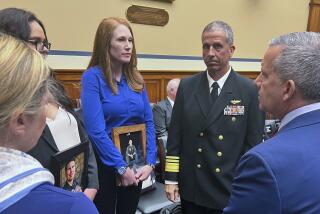Lehman’s Decision a Mistake
- Share via
Navy Secretary John F. Lehman Jr.’s decision Friday not to ground the Marine Corps’ fleet of accident-prone CH-53E Super Stallion helicopters is a mistake.
The decision is of more than passing interest to Orange County residents because about 45 of the powerful flying machines are based at the Marine Corps Air Station in Tustin, which logs thousands of helicopter operations a year over the county’s urban areas.
Considering the accident record of the Super Stallion, which has only been in operation for six years, that’s unnerving, not only for Orange County but for the helicopter crews. The entire Super Stallion fleet has been involved in at least 39 accidents and emergency landings that have caused at least 20 deaths. Most of the deaths involved military personnel stationed in Tustin (an accident in January killed five Tustin-based Marines). And last October one Super Stallion made an emergency landing in an Irvine strawberry field.
It’s no wonder that many local residents and officials think the helicopters are just accidents waiting to happen. Last January the Tustin City Council urged the Marines to stop flying the Super Stallion over populated neighborhoods, and the Irvine City Council has asked its Public Safety Commission to look into military helicopter safety.
Rep. Robert E. Badham (R-Newport Beach), a member of the House Armed Services Committee, went the cities one better and demanded that the entire fleet of Super Stallions be grounded until their safety problems were fixed. That should have been done long ago.
The questionable airworthiness of the helicopters is serious enough, but just as disturbing is the possibility that the Super Stallions have an inherent design deficiency that the Navy has known about since 1976.
Lehman’s decision Friday to allow the Super Stallions to continue flying doesn’t address that basic problem. The Navy’s decision to impose more rigid restrictions on the weight the helicopters can carry is just another Band-Aid solution.
Badham was rightfully outraged that the Navy had not been “fully open with Congress and the Marine Corps.” He wants a congressional hearing to determine how the Super Stallion’s problems managed to reach this point. Responsibility should be fixed if the Navy knowingly sent unsafe aircraft aloft. And the military should not be allowed to fly, or buy, any more of the troubled helicopters until their airworthiness is established.
The Super Stallions have been grounded twice because of mechanical problems. If there is an inherent design flaw, it must be found and corrected without delay for the safety of the air crews, the troops they carry and the residents living in constant risk below their flight paths.
More to Read
Sign up for Essential California
The most important California stories and recommendations in your inbox every morning.
You may occasionally receive promotional content from the Los Angeles Times.












